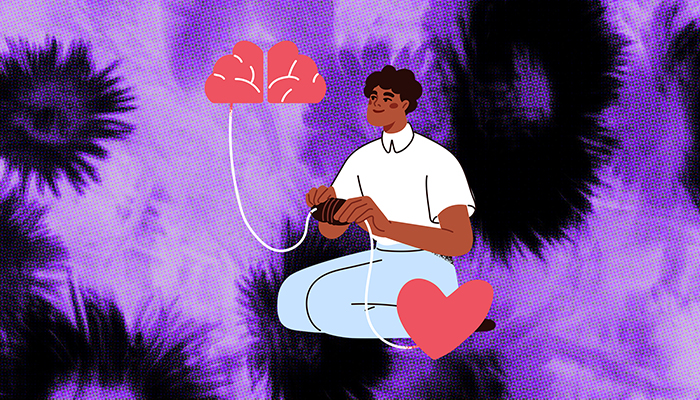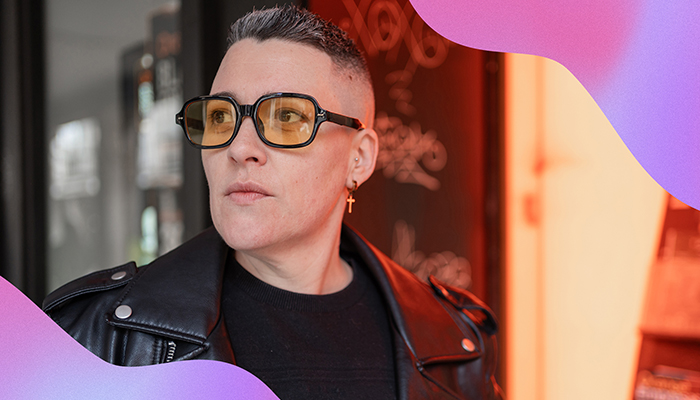This article has been clinically reviewed by E, RN.
With easing pandemic restrictions, queer nightlife is coming back with Pride month. If you find it harder to keep up with the pace you were used to just a couple of years ago, know that you’re not alone. There are some best practices to get restorative rest after (and even before) a long night of partying and staying up all night.
The 101 about sleep
Before we dive into tips, let’s start off with some basics about sleep, hormones, and our circadian rhythm. FOLX Registered Nurse E Mora explains:
“We have an internal clock that runs around a 24-hour time frame, [which] is our circadian rhythm. Every body's [clock] is a little different, though; it may be why some people are ‘early birds’ and ‘night owls’. This internal clock is in our brain and can sync up with environmental factors like light and darkness. Sleep is also affected by a light-dark cycle. Melatonin and cortisol are the hormones involved in that cycle. Melatonin is typically released into the bloodstream in the evening and early morning, and promotes sleep. Cortisol is then released into the bloodstream to awake you from your sleep.”

Does gender affirming hormone therapy impact sleep? According to Mora, there isn’t substanial evidence related to GAHT/HRT that causes sleep disorders among transgender and nonbinary people. There are studies though, related to mental health, social disparities, lack of access to necessities, and more that explain why our community has higher rates of sleep disorders as well as anxiety, depression, and other mental health conditions.
For example, a 2021 report published in Nature and Science of Sleep shows that transgender college students in North America are more likely to be diagnosed with insomnia as well sleep and mood disorders compared to their cisgender peers. However, the researchers acknowledge that discrimination, isolation, and lack of social support play a role in one’s ability to achieve regularly restful sleep.
“There have been studies that see correlations: like one study mentioned some people on testosterone HRT reported sleep apnea,” Mora explains. “But there isn't enough research to conclude causation, or many studies done to compare. There have also been studies done on cisgender women, who after being given estrogen, some reported sleeping better.”
Self-care tips for the morning after (and the night before)
In terms of self-care, there are two different types of rest: restorative and non-restorative. Restorative rest feels rejuvenating and helps us reenergize for the day ahead. Non-restorative rest, on the other hand, is described as resting (such as sleeping) that feels inadequately refreshing.
Restorative rest is the way we can recover from a restless night, whether we’ve been out clubbing or just ruminating about a stressful day or life event. In our culture where we’re encouraged to go, go, go, there’s a greater value in slowing down and catching a breath.
Stay hydrated and nourished
First and foremost, eating and drinking water take center stage if you haven’t gotten adequate rest. If you couldn’t sleep all night, nourishing yourself with a full, well-rounded breakfast is a great place to start.
Reconsider chugging down a bunch of coffee to keep yourself awake (unless you absolutely HAVE to) since this can further dehydrate you and disrupt your circadian rhythm.

Cancel plans
Don’t approach your day with “business as usual” if you are able to call out of work, cancel brunch plans, and otherwise make your schedule clear. This is a good opportunity to focus inward rather than outward.
Take naps (yes, really)
If you can, fall asleep for short periods of time. According to a recent literature review on insufficient sleep, napping about 20 minutes may be sufficient enough to help manage daytime sleepiness, although any longer than 30 minutes may produce sleep inertia. Be sure to set a timer and make sure you aren’t sleeping for longer than an hour.
Consider incorporating meditation and breathwork if you find it difficult to sit still. The meditation app Balance offers a guided meditation for naps that includes a timer.
Additionally, be mindful of the space you’re sleeping during the day. “The environment someone sleeps in is important, if they are able to manipulate it,” explains Mora. “Sleep experts suggest a cool, dark quiet place is best to sleep and rest in.”
Close your eyes
If you can’t fall asleep, consider resting your eyes. (No, doomscrolling on your phone doesn’t count!) Closing your eyes and laying down is the next best thing to actually falling asleep. Be sure to set a timer just in case you do end up falling asleep and need to be woken up!
Use radical acceptance
Dr, Shireen Rizvi, ABPP, describes radical acceptance as “accepting this instance or this situation exactly how it is in this moment… accepting that this moment couldn’t be any other way given the billions and billions of things that have happened leading up to it.”
This concept can be applied to the morning after. Accept that you might not have the energy to accomplish everything you want to today. There’s always tomorrow.
Practice self-compassion
When we’re sleep-deprived, it can be easy to get caught in a spiral of shame, guilt, frustration, and other uncomfortable feelings. It can be accompanied by thoughts of “I should’ve done this” and wishing you could rewind time. While it’s important to feel your feelings, it’s equally as important to dissect the stories we tell ourselves about our feelings. Self-compassion can lend us a hand.
If you notice you’re having difficulty sleeping often, even after practicing your sleep hygiene consistently, be sure to consult your primary care provider or other physician about your sleep problems. They may recommend you see a sleep specialist for further evaluation.
FOLX clinicians care about your holistic health and wellbeing. If you have any questions related to sleep and/or mental health, we encourage you to start a conversation by scheduling a time to meet with your clinician.
_____
FOLX Health is the first digital healthcare company designed by and for the LGBTQIA+ community. Our services include virtual primary care, gender-affirming hormone therapy including estrogen and testosterone (HRT), mental health care, sexual and reproductive health care, preventive care, and fertility consultations. FOLX memberships give you access to LGBTQIA+ expert clinicians, peer support, thousands of LGBTQIA+ resources, and more. Whether you’re lesbian, gay, bisexual, transgender, queer, gender non-conforming, or nonbinary, you can find LGBTQIA+-specialized health care that helps you meet your wellness goals. FOLX Health is health care that's queer all year. Get all the benefits of becoming a FOLX member and sign up today!



